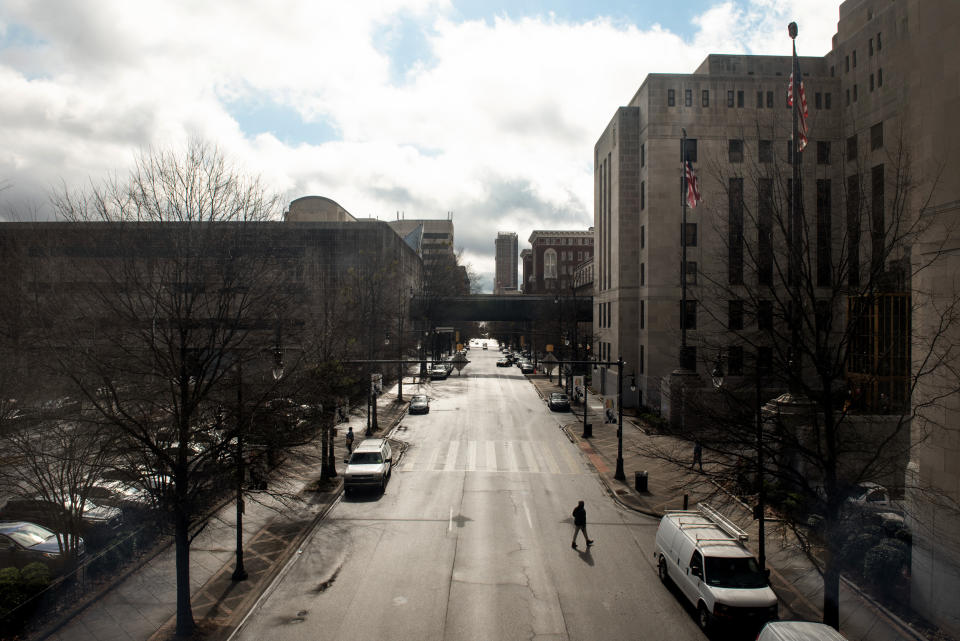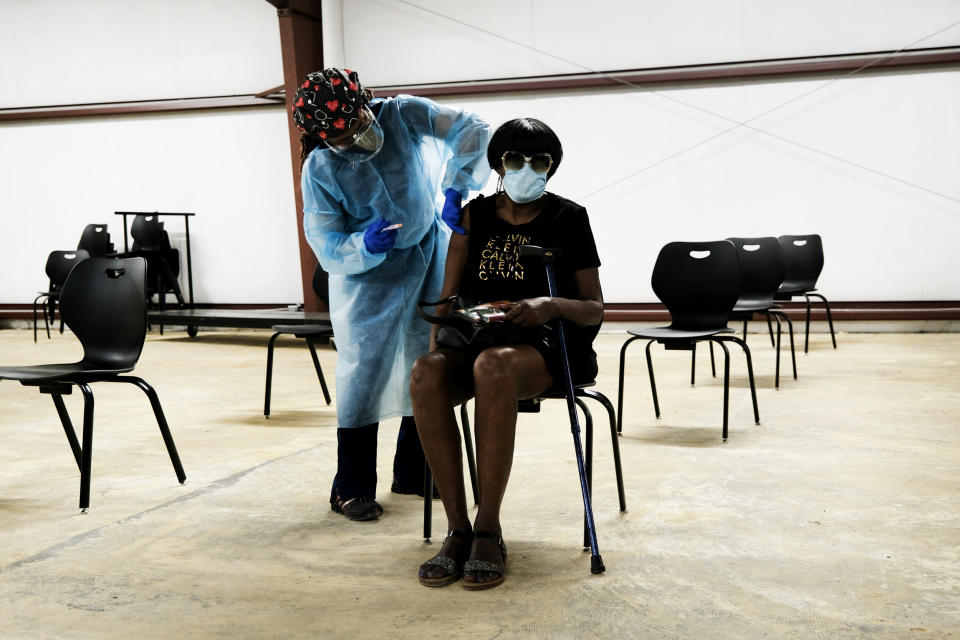The delta variant is likely to become the dominant strain in the U.S. Is America ready?
Dr. Rachael Lee is still haunted by memories of the last surge.
She recalled emotional weeks in January when cases of Covid-19 peaked in Alabama, threatening to overwhelm her hospital in Birmingham. In the months since, the situation in her city — and across the United States — has improved significantly, but Lee can’t help but feel a new looming sense of dread.
Full coverage of the coronavirus outbreak
"I think it's hard for some people to understand that this has not gone away," said Lee, an assistant professor of medicine at the University of Alabama at Birmingham. "And it's easy to forget that we're seeing the spread of these variants, and the delta variant in particular."
In Alabama, vaccination efforts have hit a wall just as the delta variant of the coronavirus, a more contagious variant first detected in India, is gaining a foothold and spreading rapidly in the country.
The variant is well on its way to becoming the dominant strain in the U.S., with cases doubling every two weeks, according to the Centers for Disease Control and Prevention. As of June 19, the variant was responsible for 20 percent of new cases. Just four days earlier, the CDC had declared the delta variant a “variant of concern,” citing growing evidence that it is more transmissible and causes more severe disease.
That could be worrisome for many states, particularly in rural parts of the Southeast, where areas with low vaccine uptake remain vulnerable to delta and potential future variants like it. The country’s patchwork recovery, with uneven vaccination rates between states and sometimes even bigger discrepancies at the local level, could mean the U.S. is on the cusp of a new wave of infections — one punctuated by local surges that disproportionately affect rural communities and pockets of the country where vaccinations have lagged.
"A variant like delta that has more transmissibility will lead to more hospitalizations and more deaths among a population that has low vaccination coverage," said Dr. Henry Walke, director of the CDC's division of preparedness and emerging infections.
That’s what Lee fears.
“In the state of Alabama, vaccine uptake has slowed to a crawl,” she said. “When we see lower vaccine uptake in places that rolled back restrictions and variants like delta spreading, that’s exactly what we infectious disease doctors worry about.”

Just under 32 percent of people in Alabama are fully vaccinated against Covid-19, compared to Vermont, one of the best-performing states, where 64 percent of its population is fully vaccinated, according to the CDC.
The situation is similar nextdoor in Mississippi, where the number of fully vaccinated individuals sits below 29 percent, leaving the vast majority of residents vulnerable to infection.
Many Mississippians who remain unvaccinated are from poor, rural areas of the state and may not be able to afford transportation to towns with adequate supplies of vaccines.
And resources in many rural areas are already strained, making it challenging for these communities to deal with Covid-19 outbreaks and hampering outreach efforts to combat vaccine hesitancy.
“This past decade we’ve seen a large number of rural hospitals and associated doctor’s offices close,” said Timothy Callaghan, an assistant professor at Texas A&M University School of Public Health who studies rural health issues. “There are just fewer physicians and medical providers in general in these rural areas, so they may not have the infrastructure in place to convince people to get vaccinated.”

Dr. DeGail Hadley, a family physician in rural Cleveland, Mississippi, also worries his neighbors are at "the point where they think they can't get the virus." He is now working with local parishes to encourage vaccination. "It takes a grassroots effort to get out to the community and talk with people," he said.
Low vaccination rates in rural Tennessee are driving new Covid-19 cases at Vanderbilt University Medical Center in Nashville, said Dr. Todd Rice, director of the center's medical intensive care unit.
"Patients we're seeing now are transferred to us from a rural area," he said, such as Macon, Trousdale and Smith counties in Tennessee. Vaccination rates in those counties hover around 20 percent, while nearly 45 percent of those living in Nashville's Davidson County are fully vaccinated.
"They're scared. They're sick. They don't feel well. They have Covid," Rice said of his patients. "When they come in, they all say, 'I should have gotten vaccinated.'"
'Sporadic tragedies'
As Tennessee shows, a state’s overall vaccination numbers can offer an incomplete picture, especially in places where there are stark differences in vaccine uptake from county to county. What that means is that while parts of the country — and even parts of certain states — with high vaccination rates will likely be able to stave off another big uptick in cases, other communities may become hotbeds of infection.
“It’ll play out as sporadic tragedies that are preventable,” said Jeremy Kamil, an associate professor of microbiology and immunology at Louisiana State University Health Shreveport. “It’s unlikely that we’ll see a replay of January 2021 in August 2021, but we’ve already had 600,000 deaths in this country. How much more do we want?”
Walke, of the CDC, said he’s particularly concerned about the potential for surges in the fall and winter, especially in areas with lower vaccine uptake.
"I'm worried about what's going to happen in September as we move indoors and as schools open up again," Walke said. "The way to protect those kids is to vaccinate everyone else."

In the United Kingdom, children are driving the surge in delta cases, Dr. Anthony Fauci, director of the National Institute for Allergy and Infectious Diseases, said during a White House Covid-19 briefing Tuesday. The delta variant accounts for more than 95 percent of cases in the U.K., he said.
Vaccine clinical trials for young children are ongoing in the U.S., but currently only people 12 and up are eligible to receive the shots. Though healthy kids are at much lower risk of serious illness and death from Covid-19, they can spread the virus.
“With children, the concern is transmission to others,” said Dr. Katherine Baumgarten, an infectious disease specialist at Ochsner Health in New Orleans. “This is now a preventable disease in those that can get vaccinated, so it’s important to continue to study the vaccine in children.”
Tracking delta
In Shreveport, Kamil and his colleagues regularly sequence the genomes of virus samples from across Louisiana, and around the country, to monitor how the coronavirus is mutating and to track where and how the different variants are spreading.
So far, 10 cases of the delta variant have been identified in Louisiana, but with less than 34 percent of people in the state fully vaccinated against Covid-19, and just 29.5 percent of people in Shreveport, Kamil knows that number could multiply quickly.
“All it takes is a small minority of people who aren’t vaccinated or have low enough immunity to allow the virus to spread and keep the pandemic smoldering,” he said.
Kamil knows because he’s seen it before, with a different variant known as alpha that was first identified in the United Kingdom. The alpha variant, which was previously called B.1.1.7, became the dominant strain in the U.S. in April, overtaking all others that had been circulating in the country.
Kamil and his colleagues at Louisiana State University Health Shreveport sequenced their first sample of the alpha variant in early April. Now, he estimates that more than 90 percent of the samples they sequence are alpha cases.
What we know about delta
There are several ways through which scientists can evaluate whether a newly identified variant is more contagious, whether it causes more severe disease and what kind of response it has to existing vaccines. The first part involves mining epidemiological data, which can reveal insights about the specific variant involved, the community where it was spreading, any symptoms the patient developed and whether the person was vaccinated or not.
But researchers can also drill down into the virus’ sequenced genome to identify specific mutations that are acquired as the pathogen replicates and evolves. These random mutations are often inconsequential, but occasionally some will make the virus better able to hijack human cells, thus making it more contagious, or change what the virus can do after it invades the body, potentially enabling it to cause more severe illness.
Download the NBC News app for full coverage of the coronavirus outbreak
"Every mutation buys the virus a lottery ticket. Sometimes that lottery ticket comes up with a mutation which enables it to transmit to more people," said Bill Hanage, an associate professor of epidemiology at the Harvard T.H. Chan School of Public Health.
In early June, British Health Secretary Matt Hancock said the delta variant was thought to be 40 percent more transmissible than the alpha variant, though studies were ongoing at the time. Subsequent research from Public Health England suggested the delta variant is 60 percent more transmissible in households, compared to the alpha variant.
“As variants emerge, we are noticing that there is a difference in transmissibility as well as the potential for more dangerous outcomes,” said Dr. Alejandro Perez-Trepichio, an internist and chief medical officer for the Millennium Physician Group, which represents 550 doctors across 19 counties in Florida. “In the case of the delta variant, its transmission rate has been quoted as 40 to 60 percent higher than the previous U.K. variant, and that was in turn higher than the original one. So we’re seeing this multiplying effect.”
Based on data from the U.K., there are indications that the vaccines may be slightly less effective against the delta variant, compared to alpha and others that were previously identified. This is especially true for people who have received only one shot of a two-dose regimen.
But as was the case with the alpha variant, the available vaccines appear to offer good protection against delta in people who are fully vaccinated. An analysis released June 14 by Public Health England found that two doses of the Pfizer-BioNTech vaccine were 96 percent effective against hospitalization from the delta variant and two doses of the AstraZeneca vaccine were 92 percent effective.
“It certainly raises the stakes for vaccination,” Kamil said of the results.
And if breakthrough infections — meaning infections in fully vaccinated people — do occur, they appear to be mild. "You've taken something that would have been serious and turned it into something which is manageable," Hanage said.
As the delta variant continues to take hold in the U.S., epidemiologists are paying close attention to what's happening in Southeastern states like Alabama, Florida and Mississippi — particularly in those areas with low vaccination rates.
"It was about this time last year that the South started demonstrating to us that yes, this can transmit in the summer," Hanage said. "It'll be very interesting and quite valuable to see what happens."
Follow NBC HEALTH on Twitter & Facebook.

